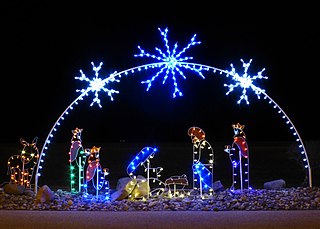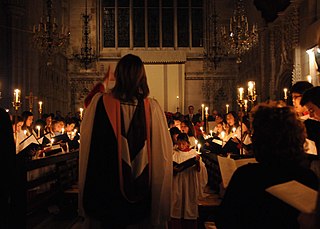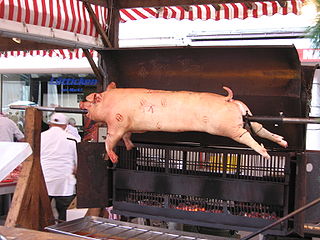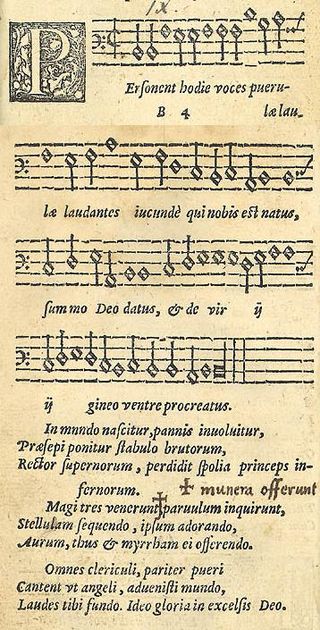
Christmas is an annual festival commemorating the birth of Jesus Christ, who is worshipped as the Son of God in Christianity, the world's largest religion. Observed primarily on December 25, it's a feast central to the Christian liturgical year and follows the season of Advent or the Nativity Fast, and initiates the season of Christmastide, which historically in the West lasts twelve days and culminates on Twelfth Night. Christmas Day is a public holiday in most countries, is celebrated religiously by a majority of Christians, as well as culturally by many non-Christians, and forms an integral part of the holiday season organized around it.

Yule is a winter festival historically observed by the Germanic peoples that was incorporated into Christmas during the Christianisation of the Germanic peoples. In present times adherents of some new religious movements celebrate Yule independently of the Christian festival. Scholars have connected the original celebrations of Yule to the Wild Hunt, the god Odin, and the heathen Anglo-Saxon Mōdraniht. The term Yule and cognates are still used in English and the Scandinavian languages as well as in Finnish and Estonian to describe Christmas and other festivals occurring during the winter holiday season. Furthermore, some present-day Christmas customs and traditions such as the Yule log, Yule goat, Yule boar, Yule singing, and others may have connections to older pagan Yule traditions.

The Yule log, Yule clog, or Christmas block is a specially selected log burnt on a hearth as a winter tradition in regions of Europe, and subsequently North America. The origin of the folk custom is unclear. Like other traditions associated with Yule, the custom may ultimately derive from Proto-Indo-European religion as similar traditions have been recorded in Celtic, Germanic, Baltic and Slavic paganism, among others.

A Christmas carol is a carol on the theme of Christmas, traditionally sung at Christmas itself or during the surrounding Christmas holiday season. The term noel has sometimes been used, especially for carols of French origin. Christmas carols may be regarded as a subset of the broader category of Christmas music.

Nine Lessons and Carols, also known as the Festival of Nine Lessons and Carols and Service of Nine Lessons and Carols, is a service of Christian worship traditionally celebrated on or near Christmas Eve. The story of the fall of humanity, the promise of the Messiah, and the birth of Jesus is told in nine short Bible readings or lessons from Genesis, the prophetic books and the Gospels, interspersed with the singing of Christmas carols, hymns and choir anthems.

"Good King Wenceslas" is a Christmas carol that tells a story of a Bohemian king who goes on a journey, braving harsh winter weather, to give alms to a poor peasant on the Feast of Stephen. During the journey, his page is about to give up the struggle against the cold weather, but is enabled to continue by following the king's footprints, step for step, through the deep snow. The legend is based on the life of the Saint Wenceslaus I, Duke of Bohemia (907–935), who was not a king but a duke.

John Milford Rutter is an English composer, conductor, editor, arranger, and record producer, mainly of choral music.
"O Come, All Ye Faithful", also known as "Adeste Fideles", is a Christmas carol that has been attributed to various authors, including John Francis Wade (1711–1786), John Reading (1645–1692), King John IV of Portugal (1604–1656), and anonymous Cistercian monks. The earliest printed version is in a book published by Wade. A manuscript by Wade, dating to 1751, is held by Stonyhurst College in Lancashire.

A Christmas ham or Yule ham is a ham often served for Christmas dinner or during Yule in Northern Europe and the Anglosphere. The style of preparation varies widely by place and time.

Jul or jol is the term used for the Christmas holiday season in Scandinavia and parts of Scotland. Originally, jul was the name of a month in the old Germanic calendar. The concept of jul as a period of time rather than a specific event prevailed in Scandinavia; in modern times, jul is a period of time stretching from the fourth Sunday before Christmas Eve, December 24, to (traditionally) mid-January at the date of Epiphany with the month of December and Christmas, and the week up to the New Year, as its highlight. The modern English yule and yuletide are cognates with this term.
"Deck the Halls” is a traditional Christmas carol. The melody is Welsh, dating back to the sixteenth century, and belongs to a winter carol, "Nos Galan", while the English lyrics, written by the Scottish musician Thomas Oliphant, date to 1862.

A pig roast or hog roast is an event or gathering which involves the barbecuing of a whole pig.

"Resonet in laudibus" is a 14th-century Christmas carol which was widely known in medieval Europe, and is still performed today. Although probably earlier, in manuscript form it first appears in the Moosburg gradual of 1360 and occurs in several 15th, 16th and 17th century printed collections from both Catholic and Lutheran traditions.
The Boar's Head Feast is a festival of the Christmas season.

"In dulci jubilo" is a traditional Christmas carol. In its original setting, the carol is a macaronic text of German and Latin dating from the Middle Ages. Subsequent translations into English, such as J. M. Neale's arrangement "Good Christian Men, Rejoice" have increased its popularity, and Robert Pearsall's 1837 macaronic translation is a mainstay of the Christmas Nine Lessons and Carols repertoire. J. S. Bach's chorale prelude based on the tune is also a traditional postlude for Christmas services.

Jul, the Danish Jule and Christmas, is celebrated throughout December starting either at the beginning of Advent or on 1 December with a variety of traditions. Christmas Eve, Juleaften, the main event of Jul, is celebrated on the evening of 24 December, the evening before the two Christmas holidays, 25 and 26 December. Celebrating on the eve before Christmas is also used for most other holidays in Denmark.

"Personent hodie" is a Christmas carol originally published in the 1582 Finnish song book Piae Cantiones, a volume of 74 Medieval songs with Latin texts collected by Jacobus Finno, a Swedish Lutheran cleric, and published by T.P. Rutha. The song book had its origins in the libraries of cathedral song schools, whose repertory had strong links with medieval Prague, where clerical students from Finland and Sweden had studied for generations. A melody found in a 1360 manuscript from the nearby Bavarian city of Moosburg in Germany is highly similar, and it is from this manuscript that the song is usually dated.
The sonargǫltr or sónargǫltr was the boar sacrificed as part of the celebration of Yule in Germanic paganism, on whose bristles solemn vows were made in some forms of a tradition known as heitstrenging.














